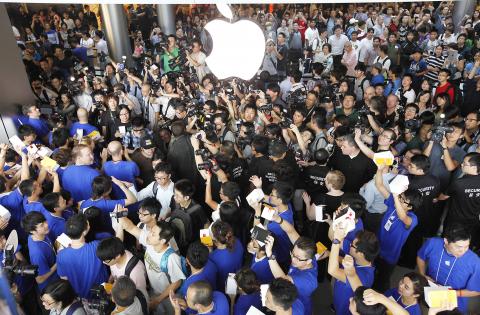Apple threw open the doors to its first store in Hong Kong yesterday, its latest push to tap the booming China market, as protesters accused the technology giant of supporting sweatshop labor.
The minimalist store spread over two floors in one of Hong Kong’s most upmarket shopping malls is Apple’s sixth outlet in China, launching just a day after the doors opened on another new branch in Shanghai.
Apple’s second-quarter revenue in Greater China — which includes Taiwan and Hong Kong — reached US$3.8 billion, a six-fold rise on the same period a year earlier, making the region a key driver of the company’s record results.

Photo: EPA
Die-hard fans in China, which has the world’s largest online population with 485 million users, have been known to line up for days to get their hands on the latest Apple products.
A queue of more than 1,000 people snaked along an overpass near Hong Kong’s Victoria Harbour, with some people waiting since Friday to be among the first inside yesterday.
Employees handed out free T-shirts, chanted “Apple, Apple” and high-fived shoppers as they made their way up a spiral staircase set against a window showcasing the city’s skyline.
“We’ve waited a long time for Apple to come to Hong Kong,” postal worker Tony Cho, 24, said as he checked out a sleek MacBook Air laptop. “It’s a very exciting atmosphere.”
Previously, Apple products were available in Hong Kong through registered dealers and online, but the opening yesterday marked the first branded Apple store in the territory.
Some dropped by the mall just to take a picture of the chaotic event, but Trish Peck was among those who waited eagerly to take a peek inside the shopping-mad city’s newest retail phenomenon.
“Hong Kong really knows how to tap the consumer slant,” she said.
“We haven’t quite hit the China consumer level yet. For us, it’s about education [for the children] ... but there is a certain cachet with the brand,” she said.
About 20 activists from the group Students & Scholars Against Corporate Misbehavior protested outside the store, chanting and holdings placards that read “No more iSlave” and “Apple is a sweatshop.”
Security staff prevented activists from hanging a protest banner on the overpass where shoppers were queuing, a spokeswoman for the demonstrators said.
The group took aim at the California-based firm over one of its key suppliers, Taiwan’s Foxconn, which is the world’s largest maker of computer components and assembles products for Apple, Sony and Nokia. Labor rights activists have heaped criticism on Foxconn after more than a dozen employees died in apparent suicides at its plants last year, which critics blamed on tough working conditions.
An Apple spokeswoman could not be immediately reached for comment.
China’s craze for all things Apple has led to widespread cloning of iPhones and iPads, and in July an American blogger uncovered fake Apple stores in the southwestern city of Kunming.
The shop was so convincing even the staff — who wore Apple’s trademark blue T-shirts with name badges around their necks — thought they worked for the company.
Two other rip-off Apple shops were nearby, one of them sporting a sign reading “Apple Stoer.”

Taiwan would remain in the same international network for carrying out cross-border payments and would not be marginalized on the world stage, despite jostling among international powers, central bank Governor Yang Chin-long (楊金龍) said yesterday. Yang made the remarks during a speech at an annual event organized by Financial Information Service Co (財金資訊), which oversees Taiwan’s banking, payment and settlement systems. “The US dollar will remain the world’s major cross-border payment tool, given its high liquidity, legality and safe-haven status,” Yang said. Russia is pushing for a new cross-border payment system and highlighted the issue during a BRICS summit in October. The existing system

Taiwan Semiconductor Manufacturing Co (TSMC, 台積電) is expected to grow its revenue by about 25 percent to a new record high next year, driven by robust demand for advanced technologies used in artificial intelligence (AI) applications and crypto mining, International Data Corp (IDC) said yesterday. That would see TSMC secure a 67 percent share of the world’s foundry market next year, from 64 percent this year, IDC senior semiconductor research manager Galen Zeng (曾冠瑋) predicted. In the broader foundry definition, TSMC would see its market share rise to 36 percent next year from 33 percent this year, he said. To address concerns

Intel Corp chief financial officer Dave Zinsner said that a formal separation of the company’s factory and product development divisions is an open question that would be decided by the chipmaker’s next leader. Zinsner, who is serving as interim co-CEO following this month’s ouster of Pat Gelsinger, made the remarks on Thursday at the Barclays technology conference in San Francisco alongside co-CEO Michelle Johnston Holthaus. Intel’s struggles to keep pace with rivals — along with its deteriorating financial condition — have spurred speculation that the next CEO would make dramatic changes. That has included talk of a split of the company’s manufacturing

PROTECTIONISM: The tariffs would go into effect on Jan. 1 and are meant to protect the US’ clean energy sector from unfair Chinese practices, the US trade chief said US President Joe Biden’s administration plans to raise tariffs on solar wafers, polysilicon and some tungsten products from China to protect US clean energy businesses. The notice from the Office of US Trade Representative (USTR) said tariffs on Chinese-made solar wafers and polysilicon would rise to 50 percent from 25 percent and duties on certain tungsten products would increase from zero to 25 percent, effective on Jan. 1, following a review of Chinese trade practices under Section 301 of the US Trade Act of 1974. The decision followed a public comment period after the USTR said in September that it was considering